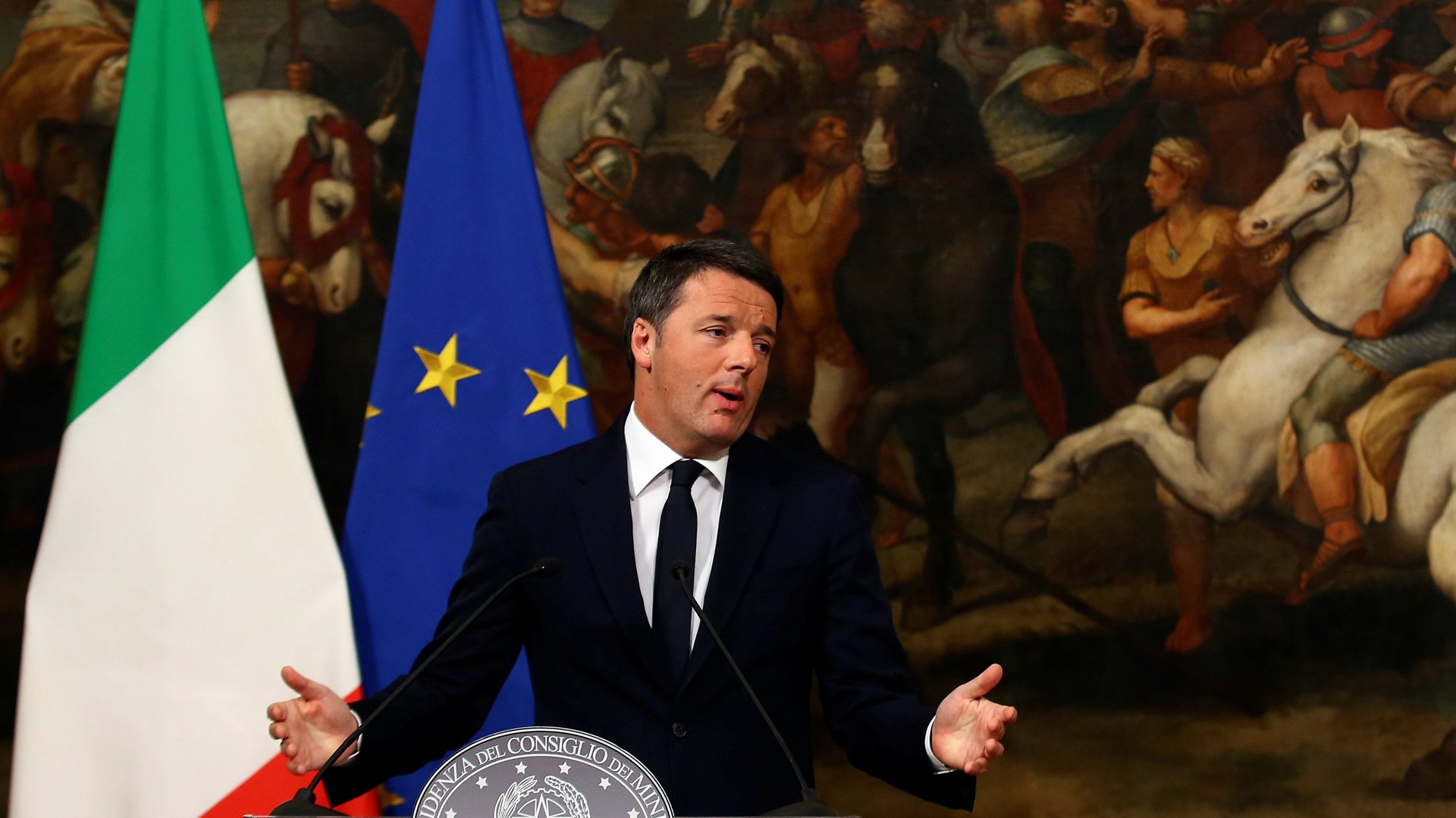If the Italian referendum was like Brexit, markets would be freaking out a lot more
Yesterday, Italians rejected the establishment in a referendum by voting against constitutional changes proposed by the government. Prime minister Matteo Renzi promptly resigned, yet another centrist leader felled by the forces of populism. With far-right, anti-establishment, euroskeptic parties ascendant, is this Italy’s Brexit moment?


Yesterday, Italians rejected the establishment in a referendum by voting against constitutional changes proposed by the government. Prime minister Matteo Renzi promptly resigned, yet another centrist leader felled by the forces of populism. With far-right, anti-establishment, euroskeptic parties ascendant, is this Italy’s Brexit moment?
Although Renzi’s referendum-linked resignation recalls the fate of former British prime minister David Cameron, that’s where many of the similarities to Brexit end. Italy is still many steps away from leaving the euro zone or European Union. And despite its stagnant economy, troubled banking sector, and political power vacuum, the markets don’t look too worried on the first trading day after the referendum.
The euro fell overnight, touching its lowest level against the dollar in 20 months at one point, but by mid-morning in Europe, it recovered all of its losses (and then some). This is in sharp contrast to the carnage for the British pound on the day after the Brexit vote in June:
That said, the euro is still close to historic lows. Currency strategists at Société Générale expect the euro to fall to parity with the dollar by spring next year, around the time when the French could elect Marine Le Pen of the far-right, anti-EU National Front to the presidency. For traders, the fate of the euro depends more heavily on the outcome of general elections in France and Germany next year than wrangling over Italy’s constitution this year.
Investors dumped Italian bonds today, sending the 10-year government bond yield to its highest level since mid-2015 (yields rise when prices fall). This widened the gap between Italian and German bonds, a key gauge of riskiness, but the spread remains narrower than it was last week, signaling no immediate panic.
In the upside-down world of bonds, higher yields aren’t necessarily a bad sign, either. After the Brexit vote, yields fell to record lows around the world in anticipation of emergency stimulus from the UK’s central bank (taking the form of printing money to buy bonds). Investors aren’t expecting such a strong reaction from the European Central Bank. Policymakers meet later this week (Dec. 8), and while they might choose to extend their current bond-buying program, this won’t come as a huge surprise to the market given persistent weakness across the continent, not just in Italy.
Moreover, the ECB’s stimulus to date has prevented big selloffs in the European bond market because it acts as a large and constant buyer of debt. Italy’s 10-year yield rising above 2% is no big deal in the grand scheme of things.
Where the real nerves are is in the Italian banking system, which is sitting on a €350 billion ($375 billion) mountain of bad loans. By some estimates, Italian banks need an injection of €40 billion to build up their buffers to acceptable levels. An index of Italian bank stocks fell by 2.2% today amid concern that Renzi’s defeat will slow a crucial government-led plan to recapitalize the banks.
Shares in Italy’s largest bank, UniCredit, sank more than 3%, while shares in Monte dei Paschi di Siena (the oldest and one of the most vulnerable) dropped by 4% on the day when bankers are due to meet (paywall) to come up with a rescue plan for the teetering lender. Meanwhile, European stocks more broadly showed no ill effects after the Italian vote, and US markets are also trading higher at the time of writing.
For the most part, the relative calm in the markets is a relief for Italy and the ECB. But some argue that a mild panic wouldn’t necessarily be a bad thing. Raj Badiani, senior Italian economist at IHS Global Insight, said “some market pressure needs to be in place to ensure Italy finds a working and sustainable political solution to ensure that a potentially explosive snap election is avoided.”
He makes an important point. After the Brexit vote, the plummeting pound became the most effective opposition to government officials pushing for a “hard Brexit.” In Italy, the sanguine market reaction to the referendum rejection shouldn’t be taken to mean that the nation’s problems aren’t severe. Italy is about to get its sixth prime minister in 10 years, and even investors used to Italian political turmoil aren’t resting easy. Although this isn’t on the same scale of Brexit, the referendum rejection and Renzi’s resignation pushes Italy closer to several nastier scenarios that will keep investors awake at night.